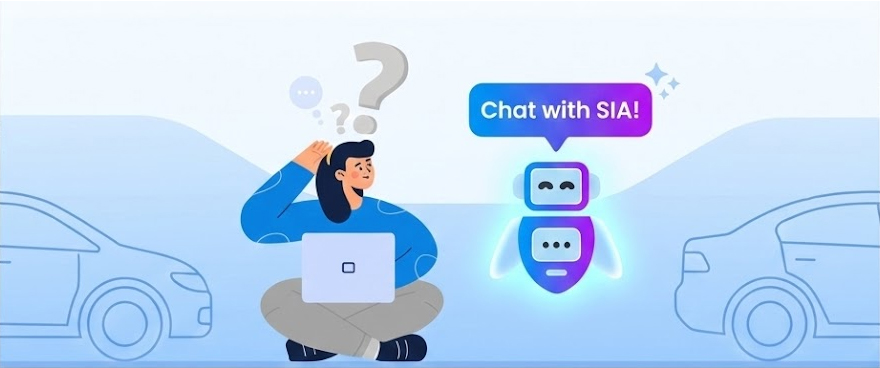If you're driving in Dubai or anywhere in the UAE, you're in for an exciting ride! The roads here are well-kept, and the scenery is stunning. But like anywhere else, knowing the traffic rules is key to enjoying a smooth drive and avoiding fines. In this guide, we'll break down the 2025 traffic rules, especially around speed limits and buffer zones, so you can drive confidently.

Speed Limits in Dubai and the UAE (2025 Edition)
Traffic rules in Dubai and across the UAE are managed by authorities like the Roads and Transport Authority (RTA) and the local police. Speed limits are clearly posted, and most drivers here know that it's best to stick to them. Here's a quick breakdown:
- Urban Roads and Residential Areas: Speed limits usually range from 40 km/h to 60 km/h, so be on the lookout for posted signs that might change depending on the area.
- Main Roads within Cities: These roads often have speed limits between 70 km/h and 90 km/h. Roads like Al Khail Road and parts of Sheikh Mohammed Bin Zayed Road fall into this category.
- Highways and Expressways: These are your typical long stretches like Sheikh Zayed Road (E11) and Emirates Road (E611), with speed limits ranging from 100 km/h to 120 km/h. Just remember to watch for signs since they might vary.
- School and Construction Zones: Here, speed limits drop significantly to 30 km/h or 40 km/h. Always slow down in these areas for safety.
What's New in 2025?
Not much has changed with speed limits across the country for 2025. However, the authorities are constantly looking at traffic patterns and making changes where needed. Keep an eye on announcements from Dubai Police or the RTA to stay updated on any adjustments.
The Buffer Zone: What's the Deal?
Let's talk about the "buffer zone." You might have heard that you can drive a little faster than the posted speed limit and avoid a fine. That's true, but there's a catch!
Top 10 Streets in Dubai with Speed Limits:

Understanding Speed Cameras and How They Work
According to Dubai Police, the buffer zone allows drivers to exceed the posted speed limit by up to 20 km/h without getting fined. So, if the limit is 100 km/h, you could drive up to 120 km/h and not immediately face a penalty.
But here's the important part: the buffer is not a free pass to speed. It's more like a tolerance from the authorities. So, it's still safest to stick to the speed limit, and don't count on that buffer to keep you in the clear.
How the Buffer Works in Real Life
- Scenario 1: Sheikh Zayed Road: You're on Sheikh Zayed Road, where the speed limit is 100 km/h. Traffic is moving at around 95 km/h. Technically, you could go up to 120 km/h without getting fined, but it's safer to stick close to the flow of traffic and avoid any sudden moves.
- Scenario 2: Al Khail Road: On a quiet stretch of Al Khail Road, the speed limit is 80 km/h. You're cruising at 95 km/h. Even though you're still within the buffer zone, going 15 km/h over the limit can make it harder to stop in an emergency.
- Scenario 3: Emirates Road with a Digital Sign: If you're on Emirates Road and see a temporary sign indicating a reduced limit of 100 km/h, that buffer zone may no longer apply. If you exceed 100 km/h, even though your usual buffer might let you go higher, you could still get a fine.
Speed Cameras in Dubai
Dubai uses advanced speed cameras to monitor traffic and keep everyone safe. These cameras can be fixed, mobile, or even use average speed measurements over longer stretches of road. Here's how they work:
- Speed Measurement: The camera uses radar or laser to measure your speed as you pass by.
- Triggering: If you're speeding past the limit (taking the buffer zone into account), the camera snaps a picture.
- Processing: The fine is then processed and sent to you.

So, no matter how much you rely on the buffer zone, remember those cameras are watching!
Traffic Fines and Penalties in Dubai (2025)
Speeding fines can get steep here. Here's a look at what you might face:
- Fines: The faster you go, the higher the fine. If you exceed the speed limit by a lot, the fines increase.
Black Points: If you rack up too many speeding violations, black points can be added to your driving record. Too many points could even lead to suspension.
Vehicle Impoundment: For serious speeding offenses, authorities can impound your vehicle.
It's always best to check out the official RTA website or the Dubai Police app to see your fines or get updates on any new penalties.
Tips for Safe Driving in Dubai
Staying safe and avoiding fines comes down to following a few simple rules:
- Stick to the Speed Limit: Always be aware of the posted signs and adjust your speed accordingly.
- Drive with Caution: Especially in traffic or on unfamiliar roads. Pay attention to your surroundings.
- Keep a Safe Distance: Follow the three-second rule so you have time to react to sudden stops.
- Signal Early: Let others know what you're doing by using your indicators well in advance.
- Stay Focused: Don't get distracted by your phone or other devices.
- Adapt to Weather: Slow down during rain, sandstorms, or fog, and increase your following distance.
Quick FAQs on Dubai's Speed Limits
- Grace Period for New Speed Limits?: New limits are usually enforced right away, so don't wait for a grace period.
- How to Check Traffic Fines?: Use the RTA website or the Dubai Police app to check and pay fines.
- Do Tourists Get Fined?: Yes, all drivers, including tourists, must follow the traffic rules. Rental companies might even help you with fines if you're returning a vehicle.
- Are Emergency Vehicles Exempt?: Yes, emergency vehicles can exceed speed limits when responding to emergencies.
Drive Smart with SelfDrive UAE
Driving in Dubai can be an enjoyable experience when you follow the rules and respect the limits. While the buffer zone offers a bit of flexibility, it's always best to maintain a safe speed and stick to the posted limits.
For the latest updates on speed limits and traffic fines, be sure to check the official RTA website or the Dubai Police app. These resources provide everything you need to stay safe and avoid unnecessary penalties. Happy driving with SelfDrive UAE! For the best car rental options and affordable rates, visit SelfDrive for a seamless experience on the roads.
Disclaimer: The information provided in this blog is based on the latest available data for 2025 and may be subject to change. We recommend verifying traffic rules and speed limits with official sources, such as the Roads and Transport Authority (RTA) or Dubai Police, for the most current updates and regulations.


